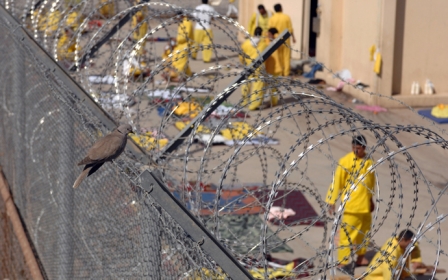EU arms exports to Egypt fuel killings, torture: Amnesty

Amnesty International has accused nearly half of the European Union's members of fuelling killings and torture among other abuses in Egypt through arms exports, in a report issued on Wednesday.
International organisations have accused Egyptian President Abdel Fattah al-Sisi of running an ultra-authoritarian and repressive regime since he deposed his democratically elected predecessor Mohamed Morsi in 2013.
In its report, Amnesty said "12 out of 28 EU member states have remained among Egypt's main suppliers of arms and policing equipment".
Amnesty said this flouted an EU-wide suspension on arms transfers to Egypt imposed after hundreds of protesters were killed in what it called a "show of grossly excessive force" in August 2013.
The London-based human rights watchdog said it feared the suspension could be scrapped, even though it was insufficient.
"In 2014 alone, EU states authorised 290 licences for military equipment to Egypt, totalling more than 6 billion euros ($6.77 billion)," Amnesty said.
Items the EU member states shipped to Egypt included small arms, light weapons and ammunition, armoured vehicles, military helicopters, heavier weapons and surveillance technology.
"The EU should immediately impose an embargo on all transfers of the types of arms and equipment being used by Egypt to commit serious human rights violations," said Brian Wood, head of arms control and human rights at Amnesty.
Amnesty said the human rights situation had gotten worse and worse, with repression remaining "rife" and virtually "no accountability".
“Almost three years on from the mass killings that led the EU to call on its member states to halt arms transfers to Egypt, the human rights situation has actually deteriorated,” said Magdalena Mughrabi, Amnesty's interim deputy Middle East and North Africa programme director.
"Excessive use of force, mass arbitrary arrests, torture, and enforced disappearances having become a part of the security forces' modus operandi."
The report added that Egypt's military operations against hardline fighters in the Sinai Peninsula had been carried out with a complete lack of transparency.
'Bonanza of arms supplies'
"EU states transferring arms and policing equipment to Egyptian forces carrying out enforced disappearances, torture and arbitrary arrests on a mass scale are acting recklessly and are risking complicity in these serious violations," she said.
Companies from several EU countries - including Britain, Germany and Italy - had also supplied Egypt with "sophisticated equipment or technologies destined for use in state surveillance," it said, citing Privacy International.
Amnesty said it feared they "may be used to suppress peaceful dissent and violate the right to privacy".
It named the nine other countries as Bulgaria, Cyprus, the Czech Republic, France, Hungary, Poland, Romania, Slovakia and Spain.
Amnesty also expressed concerns about a further loosening or discontinuation of the EU suspension, following the US decision last year to resume military aid to Egypt to the tune of $1.3 billion annually.
"The EU and its members must stop rewarding bad behaviour by Egypt's police and military with a bonanza of arms supplies."
Since the army ousted Morsi in 2013, authorities have launched a brutal crackdown on his supporters that has seen thousands killed and tens of thousands jailed.
Stay informed with MEE's newsletters
Sign up to get the latest alerts, insights and analysis, starting with Turkey Unpacked
Middle East Eye delivers independent and unrivalled coverage and analysis of the Middle East, North Africa and beyond. To learn more about republishing this content and the associated fees, please fill out this form. More about MEE can be found here.




